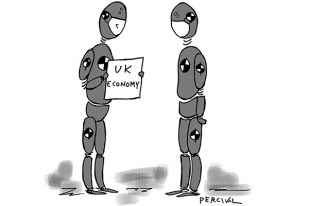Tory MPs are already starting to talk about May’s various elections. Boris Johnson’s first post-Covid electoral test will take place on 6 May and will show the durability — or otherwise — of his 2019 electoral coalition now that Brexit is ‘done’ and Jeremy Corbyn is gone. Can the Tories hold on to the much-prized Teesside and West Midlands mayoralties? If the answer is yes, the party will feel it can face the future with confidence. If not, it will start to panic.
But the most significant result of the night will be the most predictable one: a Scottish National party victory in Holyrood. The SNP is currently polling comfortably, and consistently, at more than 50 per cent. Even normally optimistic Tories are downbeat about the prospects of denying the nationalists a majority. ‘On the election result front, pessimism is realism,’ one tells me.
An SNP majority means that Nicola Sturgeon will once again request a second independence referendum from Westminster. She will say that her party’s victory, won on the back of a manifesto commitment to another referendum, gives her a mandate. She will claim (not entirely unjustifiably) that denying her request would be denying democracy.

Inside the SNP there is a hungry army of activists who will insist that she makes an early demand for a vote. Ian Blackford, SNP leader at Westminster, has already said that the referendum must take place next year. In Whitehall, there is confidence that such a deadline can be rebuffed on the basis that ‘now is not the time’ and that both governments should instead focus on getting the economy going again post-Covid.
This line is plausible and, crucially, reasonable. But it is only a temporary fix. How can the UK government deal with the Scottish question in the medium term?
Johnson revealed too much of his own thinking on Monday night. When northern Tory MPs asked if there should be more devolution to the English regions, he said that devolution had been a ‘disaster’ in Scotland and that it was Tony Blair’s biggest mistake. (That’s saying something, given that The Spectator under his editorship campaigned for Blair’s impeachment over the Iraq war.) His statement is not entirely wrong, though. It is hard to see what problem devolution has solved. It has certainly not killed ‘nationalism stone dead’, as George Robertson, the then shadow Scotland secretary, predicted it would in 1995. The late Tam Dalyell seems to have been closer to the mark when he warned in 1979 that devolution would be ‘a motorway to independence with no exits’.
Talk of devolution as a ‘disaster’ will lead to the SNP claiming that Scots must vote for independence
The fact that the Scottish government is run by a party committed to the break-up of the United Kingdom has undoubtedly changed the dynamics of devolution — and Brexit makes things worse. The Blair government bulked out the responsibilities of the devolved assemblies by giving them nominal control over all kinds of powers that had already been sent to Brussels. Their return has created an almighty tussle over who gets to wield them now.
But for all devolution’s problems, Johnson’s comments were ill-thought-out and undisciplined. It is simply not politically possible to roll back devolution: three-quarters of the Scottish public backed the new parliament during the 1997 referendum and even more voters support it now. As one despairing Scottish Tory says of Johnson’s comments: ‘It’s true, but you file that under things that must not be said out loud.’ It is not hard to find Scottish Tories who complain that the problem is that both the Prime Minister and Alister Jack, the Scottish Secretary, approach the Scottish question by looking at a political map and declaring: ‘I wouldn’t have started from here.’
Given that the SNP could deprive him of his premiership — and end this 300-year-old Union — Johnson must learn how his words will be interpreted north of the border. His enemies seek to portray him as a blundering, aloof Old Etonian who embodies a dysfunctional UK government. He mustn’t give them the ammunition to do so. One Scottish Tory warns: ‘We need attention on this more than anything. This crisis is coming in May.’ Talk of devolution being a ‘disaster’ will lead to the SNP claiming that Scots must vote for independence to stop Westminster from taking away their parliament.
So what should be done? Well, the question that elicited Johnson’s ‘disaster’ comment contained part of the answer: there should be more devolution to the English regions. This might seem an odd response to the question of what to do about Scotland, but it could pave the way for a more federal UK. ‘It has got to be about the UK changing, not just more powers for Scotland,’ one thoughtful Unionist tells me.
At the same time, Downing Street must think more about Scotland. Douglas Ross, the leader of the Scottish Tories, often seems to be on the attack. He used his Tory conference speech to say that too many in the party treat the Union as an ‘afterthought’, and attacked the rise of English nationalism in its ranks. ‘The case for separation,’ he said, ‘is being made more effectively in London than it could ever be in Edinburgh.’ Now, one can debate the wisdom of a Tory saying all this publicly — ‘if we’re trying to out-oppose the opposition, then we’re in the worst of all possible worlds’, as one furious Secretary of State puts it — but Ross’s comments did have the ring of truth about them.
The case for Britain is still not being made. To the despair of Unionist strategists, focus groups suggest that many voters in Scotland think the furlough was a Scottish government scheme. The UK government must ensure that this confusion is not repeated when a Covid vaccine is rolled out.
Covid has helped create a Johnson vs Sturgeon dynamic in Scottish politics. This suits the SNP; the party relishes running against a British Prime Minister whose Scottish poll ratings are so poor. Sturgeon has used her daily Covid briefings to turn herself into the nation’s newscaster. But after this crisis has passed, the future of the Union will come down to how seriously the rest of the United Kingdom is prepared to reform in order to keep this country together.
SPECTATOR.CO.UK/SHOTS
Hear daily political analysis from James Forsyth, Katy Balls, Fraser Nelson and more.







Comments